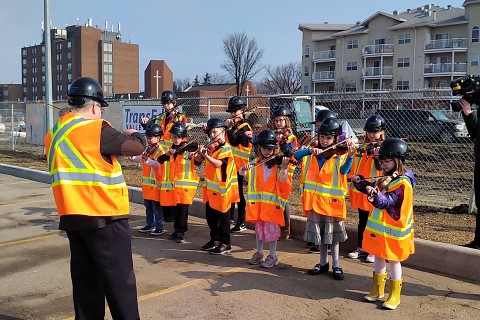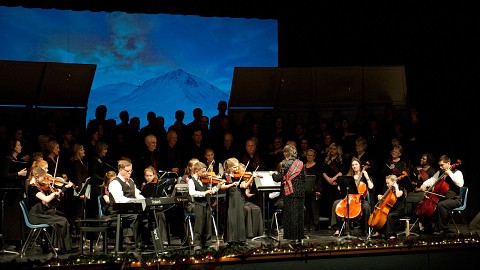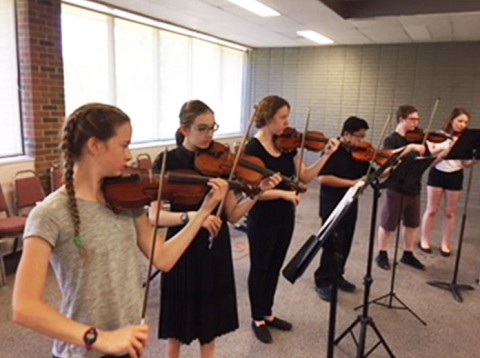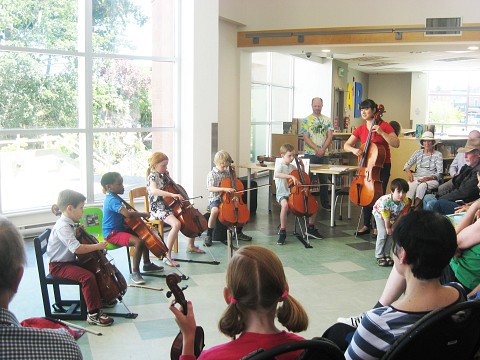 |
||||||||||||||||||||||||||
To all Canadian members of the SAA; à tous les membres canadiens de la SAA:You are cordially invited to read Volume 1, no. 2 of the Canadian Suzuki e-Newsletter, created by the Canadian Suzuki e-Newsletter Committee on behalf of all Canadian SAA members! This e-Newsletter will be sent to you twice a year: January and June. Vous êtes cordialement invités à lire le volume 1, no 2 de l’Infolettre Suzuki canadienne, créé par le Comité de l’Infolettre Suzuki canadienne au nom de tous les membres canadiens de la SAA! Cette infolettre vous sera envoyé deux fois par an: janvier et juin. Why a Canadian e-Newsletter?The idea to have a Canadian e-Newsletter grew out of a meeting of Canadian teachers at the SAA Leadership Retreat at Deer Creek Lodge, OH, in 2017 with a committee of interested teachers taking on the challenge of preparing the Newsletter you see today. We gratefully acknowledge the SAA who is publishing this e-Newsletter on our behalf. Pourquoi une Infolettre Suzuki canadienne?L’idée d’avoir l’Infolettre Suzuki canadienne est née d’une réunion d’enseignants canadiens lors de la retraite de leadership de la SAA à Deer Park en OH en 2017. Un comité d’enseignants intéressés a relevé le défi de préparer le bulletin que vous voyez aujourd’hui. Nous remercions sincèrement la SAA qui publie l’Infolettre en notre nom. Our goal:
Notre objectif:
To submit an article or announcement: Pour soumettre un article ou une annonce:
To contact a committee member: Pour se mettre en contact avec un membre du comité: Deadline for third issue: November 5, 2019 La date limite pour le 3eme numéro: le 5 novembre 2019  Bach in the Subwaysby Thomas Schoen—Alberta—Edmonton The Schoen Duo Studio celebrated Bach in the Subways on March 23, 2019. There is no subway station in our neighbourhood, but there is a new LRT station under construction! TransEd gave us permission to play some Bach on the actual construction site. Here is Thomas and a group of his students serenading the construction workers. After a minuet or two, we moved into the Bonnie Doon shopping mall where we were joined by Kathleen Schoen’s flute and recorder students and cello students of Janet Dougan for a flashmob and more music at the LRT presentation centre.  Can Do SpiritBy Flory Godinez—British Columbia—Creston “We’re Canadians—we can do this” This idea of rising to the challenge is what I’ve seen first-hand in my Suzuki string students. When we moved to the Creston Valley three years ago for my husband’s retirement, this American Suzuki teacher had no idea what awaited us, musically. The local string teachers invited me to coffee and I learned that one violin teacher was retiring, one was moving to the Maritimes, and the other two were cutting back their studios. Suddenly I had a studio ranging from beginners through Suzuki book 8. As I worked with the parents and children on tone, technique and interpretation, the opportunity to further develop their music reading skills became apparent. We progressed from sequential sight reading to small ensembles. Then with the addition of viola and cello, we moved to graded orchestra music. I have a library of U.S. graded school orchestra music which is graded differently than the Royal Conservatory system.
Each time I’ve presented a new technical challenge these youngsters and their parents from the beautiful, rural Creston Valley have exceeded my expectations. In August of last year I was approached by Anita Stushnoff, conductor of the 82-voice Blossom Valley Singers, to accompany the community choir on their weekend of three concerts entitled “A Celtic Christmas.” One piece was very easy and below the level of the students. The other orchestration was unidiomatic for strings and required re-writing. Again that Canadian “can do” spirit prevailed and they played beautifully. The Creston Valley Youth Orchestra was born! What is the value of a youth orchestra to a Suzuki program? In my two years study with Dr. Suzuki in Japan I also observed Mr. Yamashita’s massive student orchestra in Suwa city. So I learned of the precedent for an orchestra in a Suzuki program right in Japan. As students reach the crucial early teen years when many drop out of music, a student orchestra is a powerful music team that can capture the love and desire to make music together with life-long friends.  Durham Music Camp: celebrating year 5 east of Torontoby Laurie Mitchell—Ontario—Durham There are advantages and disadvantages to living outside of a big city. Fewer opportunities without long drives is definitely a disadvantage, so the teachers east of Toronto have worked together to create an affordable summer program in our own neighborhood. The amount of learning that takes place (for students and teachers alike) in one week is amazing and that is partnered with long-lasting gains in motivation! http://www.durhammusiccamp.com  Suzuki Music at the Library: Bringing group class out into the cityby Alexandra Lee—British Columbia—Nanaimo I had the enormous pleasure of doing my teacher training at the Chicago Suzuki Institute. There, the Suzuki community is thriving and constantly expanding. The number of Suzuki families at the CSI was staggering. It was an amazing experience to be able to see firsthand how successful a Suzuki community can be. After my training, I moved to British Columbia and I now teach cello at the Nanaimo Conservatory of Music. Here, as in many communities outside of larger urban centres, the Suzuki programme is still quite modest. I often find myself acting as an “ambassador” for the Suzuki method—educating and advocating for the method and, in some cases, debunking myths. Many people in our community are still unfamiliar with the Suzuki method, so it’s no surprise that they are often unaware of the Nanaimo Conservatory of Music’s Suzuki programme. One of my goals since joining the faculty has been to give the Suzuki programme more visibility. I have started with an initiative I call “Suzuki Music at the Library”. (Since the other famous Dr. Suzuki—Dr. David Suzuki, famous for his work as an environmental conservationist—hails from British Columbia, I deliberately put “Suzuki Music at the Library” to avoid confusing local environmentalists!) Our event is a mixture of part-recital, part-lecture, and part-group class. Our students (violin, viola, cello, flute, and piano) have the opportunity to perform solos or ensemble pieces. In between performances, the Suzuki faculty give short talks about different aspects of the Suzuki method—philosophy, benefits, and practice. Most of all, “Suzuki Music At The Library” shows examples of group class games. The group class element to Suzuki is one of my favourites. It’s such a joyful way of learning together. The classic group class games such as “Pass The Note” or “Follow The Leader” are illuminating to the non-Suzuki audience members. I feel that by witnessing these children having fun with sophisticated musicianship skills, the public will have greater appreciation of the benefits of the Suzuki method. The response from existing Suzuki families about the new library programme has been lovely; they appreciate their child having new experiences and new opportunities to perform. The library staff rave about the public’s feedback and appreciation of live music in this communal space; seeing children enjoy and create music adds so much to the spirit of a community. I’m sure that every teacher has their own way of incorporating community visibility in their hometowns. My partnership with the Nanaimo Harbourfront Library has certainly been a huge success and I encourage you all to make music wherever you can Un Flash Mob Suzuki pour les élèves!par Mélanie Grenier—Québec—La Jacques-Cartier En mai 2018, 50 violonistes et violoncellistes du groupe Jeux d’Archets Suzuki ont vécu leur premier Flash Mob. Des élèves débutants à très avancés entre 3 à 20 ans y ont participé. L’idée de leur faire vivre une telle expérience vient de ma philosophie de toujours chercher à faire vivre des expériences stimulantes, variées et riches de façon pédagogique à mes élèves. Ayant participé à un regroupement d’artistes de ma région, j’ai réalisé le potentiel et la variété d’endroits possibles pour une telle activité, en plus de pouvoir entremêler les activités culturelles et économiques de la région. J’ai commencé mes démarches en approchant ma ville pour solliciter leur appui. Notre MRC de La Jacques-Cartier nous a fourni les fonds nécessaires pour deux autobus. Le premier nous a servi toute la journée pour les plus vieux, et l’autre en avant-midi pour les plus jeunes et leurs parents. J’ai mis beaucoup de temps et d’efforts pour préparer l’événement. Il fallait contacter tous les établissements, noter les contraintes d’espace, de temps, faire un itinéraire, recontacter tout le monde… organiser la logistique de la journée auprès des élèves et des familles, faire le choix du répertoire qui devait tout être joué de mémoire… Et nous espérions de tout cœur une journée où il ferait beau! Nous avons joué à différents endroits : parvis d’église, journée de l’environnement, supermarché, terrain de golf, boulangerie, terrains d’un manoir, dans un restaurant réputé pour leurs bons brunchs, dans un hôtel, dans un parc de la ville… À quelques reprises j’ai séparé le groupe en 2-3 groupes pour différentes prestations. Les plus vieux permettaient une certaine flexibilité au niveau du répertoire quand ils étaient seuls en après-midi. L’énergie et le dynamisme étaient à leurs meilleurs! Les étudiants étaient pratiquement autonomes vers la fin de la journée ! Les gens que nous avons surpris étaient émus, attentifs et en voulaient encore… Les commerçants ont presque tous été accommodants et ont embarqué dans cette belle aventure avec un réel intérêt. Les jeunes pour leur part, particulièrement les plus vieux, ont eu un « blast »! Ils ont tellement aimé cela qu’ils ne rangeaient pas leurs instruments d’une place à l’autre et jouaient sans arrêt dans le bus. Certains commençaient des pièces et les autres suivaient, les jeunes lançaient l’idée d’une pièce, les autres embarquaient! Le répertoire Suzuki y est passé en plus de répertoire complémentaire tel le Canon de Pachelbel, Tzena, leur répertoire de groupe… Environ 6 heures de violon pour eux cette journée-là, et ils ne voulaient pas s’arrêter ! Saskatchewan teachers on the roadby Nicole Wilton—Saskatchewan—Saskatoon Two of our local Saskatchewan teachers went to the “Piano Basics” workshop in Orange County, California this past February. Here is their summary: Stela Popa was happy to hear that there were two Japanese teachers in California who were teaching much like Dr. Kataoka, whom Popa had seen many years ago. Stela enjoyed watching and having lessons where body movement and use of hand, wrist, and arm were all discussed. The focus of this was how to produce good long tones and how to play big chords. She is going to try this all herself as well as with her students! Lana Ramsay stated that she was searching for improvement in her own playing and tone and was therefore happy to attend a workshop on these “Basics.” At the workshop, teachers had lessons in the morning, and students attended in the afternoons. The main goal was working on beautiful tone, and making a difference in the lives of children. Key benefits and take-aways were to become aware of the subtle ways that we (as teachers) interfere with creating beautiful tone… and reminded us how to use body, arm and fingers to create that tone. Both Stela and Lana felt they came away with keener ears and practical ways to help their students. In other Saskatchewan news: Piano teacher trainer Nicole Wilton will be hosting a Unit 1 course in her Saskatoon studio in late June 2019. For details, please email her at nicolesmusic@sasktel.net or go to www.wiltonmusic.com Improvisation Training for Teachersby Kathleen Schoen Borealis Suzuki Winds Institute will be hosting Creative Ability Development (CAD) Teacher Training with Alice Kanack, August 19—23, 2019, in Edmonton, Alberta, Canada. Alice is the author of the Fun Improvisation books for Piano, Violin, Viola, and Cello, Improvising String Quartets, Musical Improvisation for Children, and Baselines & Fantasies. She is currently developing a new book in the series for young flute players. Her approach uses musical improvisation to develop full engagement in the creative process with students (and teachers!) of all ages and levels. Not only do the students enjoy her improvisation activities very much, but the freedom and ease that they develop through this work carries over into the standard repertoire. My students are now quite happy to improvise baroque ornamentation or a cadenza to a classical concerto. This CAD Teacher Training course is open to teachers of all instruments. Register at this link: Need more information? suzukifluteandrecorder@gmail.com ESPSby Rhonda McEachen Edmonton Suzuki Piano School (ESPS) was established as a non-profit society in 1977 and continues to thrive today. We are a vibrant piano community with 13 Suzuki trained teachers that provide private and group lessons to our families. Our major events include the Fall Workshop (October) and Spring Festival (March/April). Visiting students and teachers are more than welcome to participate. We are organizing the River City Suzuki Piano Institute in July 2019, where teacher training in Volume 6 will be taught by Gail Lange For further information on the Summer Institute or any of our programs, go to edmontonsuzukipiano.ca De l’intérieur vers l’extérieur : Comment développer une belle sonorité à la maisonpar Dre Mary-Elizabeth Brown “À beau cœur, belle sonorité” est l’une des citations les plus emblématiques du Dr Suzuki. La quête d’un son résonnant et chantant est à la base de chaque leçon Suzuki, mais comment pouvons-nous aider à l’enfant à poursuivre le développement de ce beau son entre son dernier coup d’archet et sa prochaine leçon? PARLEZ-EN !
Notez les mots et les idées de votre enfant pour les utiliser plus tard. Si vous aimez faire de l’artisanat ensemble, essayez d’utiliser les mots de votre enfant pour créer une œuvre d’art à exposer dans votre espace de pratique! N’ayez pas peur de répéter cet exercice à mesure que votre enfant grandit et devient plus mature. C’est agréable de voir leurs oreilles se développer. De telles discussions peuvent être un bon moyen de construire des ponts en découvrant les idées de chacun. EN PRATIQUE Revue Pièces de travail Pour tous les musiciens, même pour le plus jeune violoniste, la sonorité est étroitement liée à l’identité personnelle. Le travail sur le son exige donc de la sensibilité de la part de l’adulte ou des adultes qui travaillent avec l’enfant. Par la discussion, l’écoute active, l’auto-évaluation et les encouragements constants et doux, nous pouvons cultiver une belle sonorité tout au long de la semaine. Responding to the Preteen/Teen Thresholdby Merlin B. Thompson Have you ever noticed that around the time your students are in Junior High School, they seem to reach a threshold in their music studies? After years of consistent progress throughout elementary school, they seem satisfied with their music studies and want to continue, yet they’re often content with just working on one piece even over very long periods of time. So, what are the options? Composition, improvisation, ensemble music? How about something that will amplify every one of your preteen/teen students’ relationships with music!! Beginning in January 2018, I decided to respond to the Preteen/Teen Threshold by doing something completely new – engaging my preteen/teen students in examining their own Everyday Musical Connections through a Project-Based Learning approach. Everyday Musical Connections (EMC) is the descriptor I use to capture the breadth and depth of every person’s unique relation with music. At times, music is a companion, diversion, interruption, refuge, catalyst, and reminder. Project-Based Learning (PBL) is an established educational approach widely used in classroom settings. PBL is all about organizing learning experiences that prompt students’ active participation in their own learning, rather than giving students a series of facts to learn for an exam or tasks to master for a performance. Over the past year and a half, I have included EMC projects with impressive results for my preteen/teen students. Each week, we spend 5-6 minutes of our lesson time in fine-tuning their investigative process. Students present their finished projects at informal home concerts and formal public concerts. Parents are typically blown away by the insight and sophistication of students’ presentations. Thus far, students’ explorations have included analysis, video creation, audio presentations, PowerPoint, transcription, personal anecdotes, and live demonstration. The topics they choose are as varied as their own personalities. Everything from – what makes a good song good, to the evolution of the Batman musical theme, to how does music affect work habits. Comments from students after they finished their projects – “I learned that I know more about music than I thought.” “Now, when I need to make an analogy at school, I take examples from music.” “I loved working on something that actually belonged entirely to me.” I appreciate the way EMC explorations serve to amplify students’ own musical persona, to shine light on the depth of their relation with music, and highlight music as an important part of their lives. Students also exercise their disciplinary knowledge of music and strengthen the higher-order skills of critical thinking, problem solving, creativity, analysis, communication, and reflection. In a nutshell – using EMC projects is positively the most exciting and music-affirming activity I’ve ever employed with my preteen/teen students!! It’s completely transformed my studio! To find out more about Everyday Musical Connections and Project-Based Learning – please visit merlinthompson.com and click on Everyday Musical Connections (https://merlinthompson.com/project-based-learning/). Enseignants, soufrez-vous de l’¡Anxiété du Practicum!?par Gail Lange Voici ce que les anciens participants ont à dire au sujet de leurs expériences et à quel point ils ont bénéficié du Practicum. Est-ce angoissant de faire des vidéos de votre enseignement et de les montrer à d’autres enseignants ?
Et la leçon sur place en classe ?
Pouvez-vous identifier un aspect de votre enseignement qui a changé depuis que vous avez suivi le cours ?
Surmonter ¡l’anxiété du Practicum! ne peut pas être surestimé ! Long-term Suzuki pedagogy course offered in Waterloo, OntarioThe Suzuki String School of Guelph will be offering long-term teacher training at Wilfrid Laurier University again this coming school year. The offerings for 2019-20 are: Violin Year 1: ECC and books 1 to 4 Teacher trainer: Elayne Ras Cello Year 1: ECC and books 1 to 4 Teacher trainer: David Evenchick Violin Year 2: books 5 to 8 and Practicum Teacher trainer: Paule Barsalou
For more information about the program visit: http://artset.net/sssg/program/program/teachertraining.html or contact: Paule Barsaloupaule@artset.net or 519-836-3798 PLAY & READIn January 2019, Alfred Publishing released a new publication specifically designed for Suzuki Piano students. Merlin B. Thompson created PLAY & READ to introduce Suzuki Piano students to the music reading process. PLAY & READ builds on Suzuki Piano students’ experience of playing their Volume 1 repertoire. Each of the six lessons in PLAY & READ is based on a Volume 1 selection. What’s remarkable about PLAY & READ is that students learn to “read by ear”. That means students know what each bar sounds like before they play it and they read in groups of notes rather than one note at a time, similar to the way reading words relies on reading groups of letters rather than one letter at a time. Students are encouraged to sing, say, and write throughout PLAY & READ as a way of getting them holistically involved in the reading process. PLAY & READ has received glowing support from Suzuki Piano teachers all across Canada. It is available directly through Alfred Publishing’s website and also through your local music dealer. Canadian Teacher Training & Student ProgramsBorealis Suzuki Winds Institute Great Lakes Suzuki Flute Institute Institut Suzuki Montréal Langley Community Music School Suzuki Workshop Newfoundland and Labrador Suzuki Institute River City Suzuki Piano Institute Southwestern Ontario Suzuki Institute Suzuki Valhalla Institute |
||||||||||||||||||||||||||
|
You received this message because you are a member or supporter of the Suzuki Association of the Americas. Suzuki Association of the Americas |
||||||||||||||||||||||||||